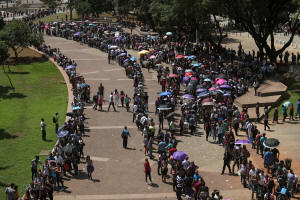|
Unemployment in Latin America's largest economy hit 8.0% in the
three months through June, down from 8.3% in the previous
rolling quarter and below market expectations, as economists
polled by Reuters had a median forecast of 8.2%.
It was the fourth consecutive drop for a rolling quarter,
according to IBGE, which said the move reflected seasonally
lower vacancy rates. There are now 8.6 million unemployed people
in Brazil, it added.
Finance Minister Fernando Haddad cautioned that despite the
positive data, the unemployment rate should not be perceived as
an indicator of a strong economy, given the country's 10% real
interest rate leading to an activity slowdown.
Brazil's benchmark interest rate stands at a six-year high of
13.75% since August 2022 as part of the central bank's bid to
lower inflation, although an easing cycle is widely expected to
start early next month.
Talking to journalist, Haddad said he sees plenty of room for
the central bank to kick off its monetary easing cycle with a
"reasonable" rate cut.
Some economists also expect high interest rates to take their
toll going ahead, as economic growth softens in the country.
"All in all, the labor market remained strong in the second
quarter, defying the drag from stiflingly high interest rates,"
Pantheon Macroeconomics' chief economist for Latin America,
Andres Abadia, said.
"But we still expect conditions to deteriorate at the margin in
Q3 and early Q4, due to the lagged effect of increased borrowing
costs in key sectors."
Even so, the latest data were still welcomed by President Luiz
Inacio Lula da Silva's government, as the leftist leader
campaigned last year pledging to reduce unemployment in the
country.
"The result shows that nothing resists hard work and that Brazil
is on the right track," Lula's chief of staff Rui Costa wrote on
messaging platform X, formerly known as Twitter.
(Reporting by Gabriel Araujo; Editing by Steven Grattan and
Alistair Bell)
[© 2023 Thomson Reuters. All rights
reserved.]
This material may not be published,
broadcast, rewritten or redistributed.
Thompson Reuters is solely responsible for this content.

|
|




